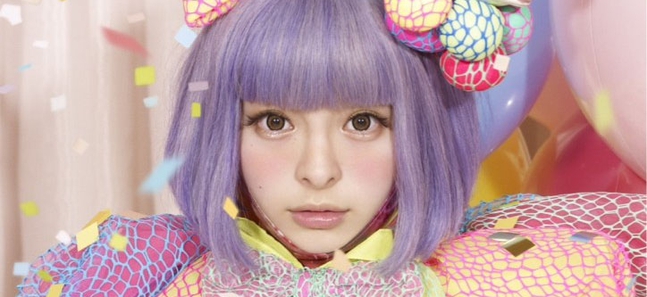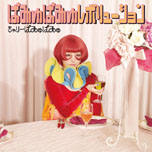Kyary Pamyu Pamyu: Pamyu Pamyu Revolution
The Harajuku pop starlet doesn’t outstay her welcome on her debut full-length

Posted: Fri Jun 01 2012

When Kyary Pamyu Pamyu elicited an internet-wide 'WTF?' with the video for debut single 'Ponponpon' last summer, it was still tempting to speculate whether the Harajuku-groomed starlet would amount to anything more than a blip on the pop charts. Perhaps it was foolish to doubt the appeal of her schtick, a blend of zany fashions and artlessly exuberant pop songs the like of which hasn't really been seen since the mid-'90s heyday of Tomoe Shinohara. It's helped propel her from cult star to almost AKB48 levels of ubiquity, popping up on TV shows, magazine covers and ads for anything from KFC to job-search magazine An.
But do we really need a full album? After the giddy delights of 'Ponponpon' – a song that still makes me smile nearly a year after it was released – there was a sense of diminishing returns in Kyary's subsequent singles. Much as it was enlightening to discover that you really could come up with a chorus more infantile than 'Ponpon wei wei wei / Ponpon wei pon wei ponpon', both 'Tsukematsukeru' and 'Candy Candy' felt a little rote and insubstantial, like they'd taken away the cake and just kept the icing. (And that's to say nothing of the way the latter – video and all – appeared to have been conceived purely for the benefit of the Glico Breo ad campaign in which it was used.)
Unsurprisingly, the garish, over-saturated sound world of Pamyu Pamyu Revolution doesn't have much room for light or shade, let alone subtlety. Producer Yasutaka Nakata seems to have reserved the jingles and synthesizer presets that were too childish, too naff or simply too irritating to use with his other main projects, Perfume and Capsule. Almost every track bears the sonic markers of children's music: circus fanfares, tinkling celeste and glockenspiel lines, '80s synth drums, choruses that amount to about half a dozen syllables each. The album hits its nadir early on with 'Minna no Uta', whose repeat-after-me refrain is a group singalong in search of a kindergarten music class.
Yet without the need to seem remotely sophisticated, Nakata also manages to have a hell of a lot of fun. For all the day-glo sheen and reductive silliness of the songwriting, there are all kinds of neat details in the production, whether it's the auto-tuned chipmunk backing vocals, the jazz sax lurking in the background on 'Onedari 44°C', or the way he cheekily incorporates riffs from Kyary's big singles into the instrumental section of closing number 'Chan Chaka Chan Chan'. Wackiest of all is 'Kyary Anan', a sort of spiritual successor to Toni Basil's 'Mickey', where a chanted refrain gets repeated until it begins to sound vaguely demented, then supplemented with what sounds like an Indian shehnai. And, er, why not?
Given Kyary's obvious limitations as a vocalist – which Nakata chooses to play up rather than disguise – it's still hard to see where she might be able to take things once the novelty of her sugar-rush anthems wears off. But for the time being, it's probably safe to enjoy this for the gaudy, guilty pop-pleasure that it is.
Time Out Tokyo rating: 
‘Pamyu Pamyu Revolution’ is out now on Warner Music Japan
Tweets
- About Us |
- Work for Time Out |
- Send us info |
- Advertising |
- Mobile edition |
- Terms & Conditions |
- Privacy policy |
- Contact Us
Copyright © 2014 Time Out Tokyo














Add your comment